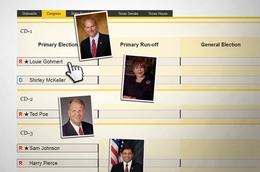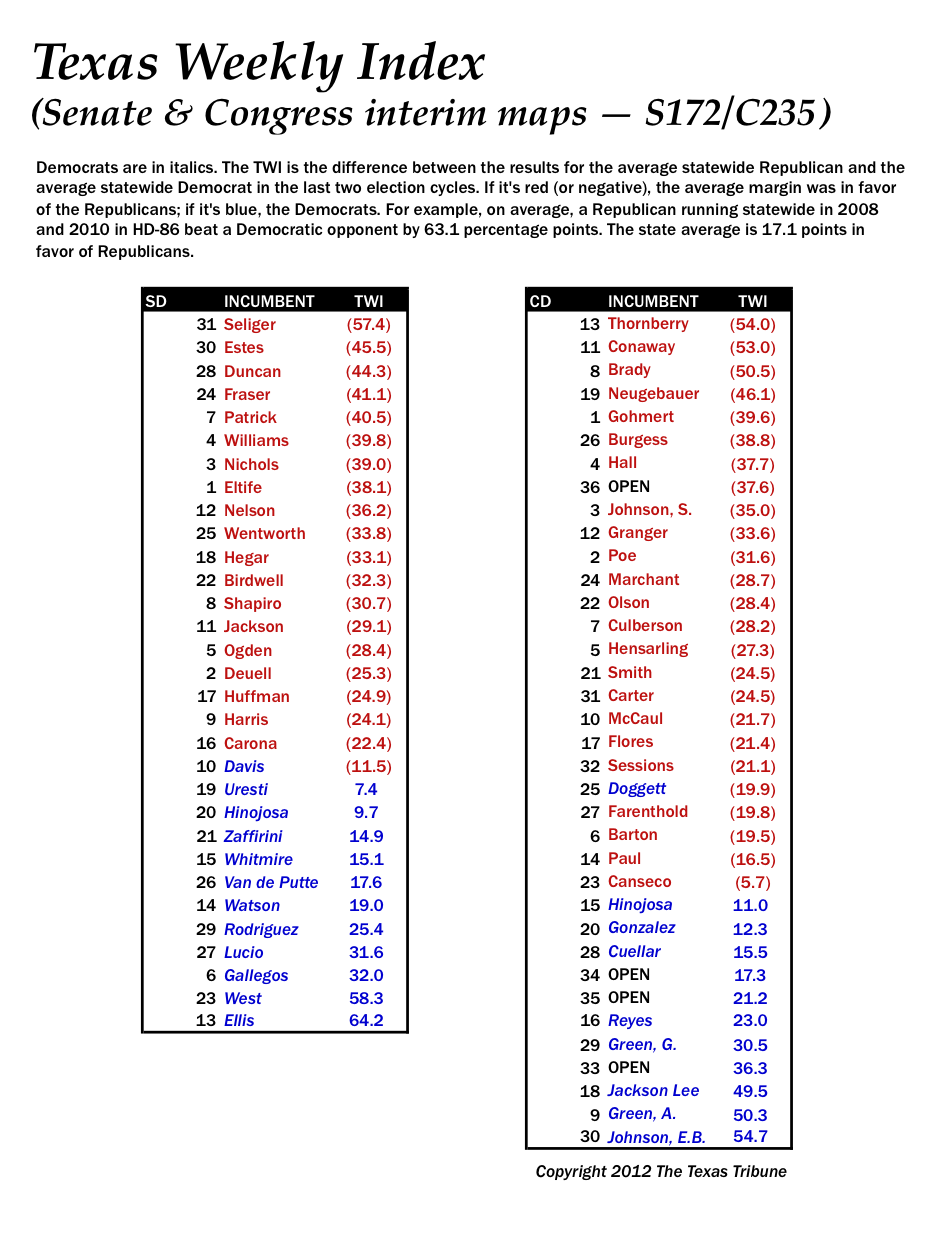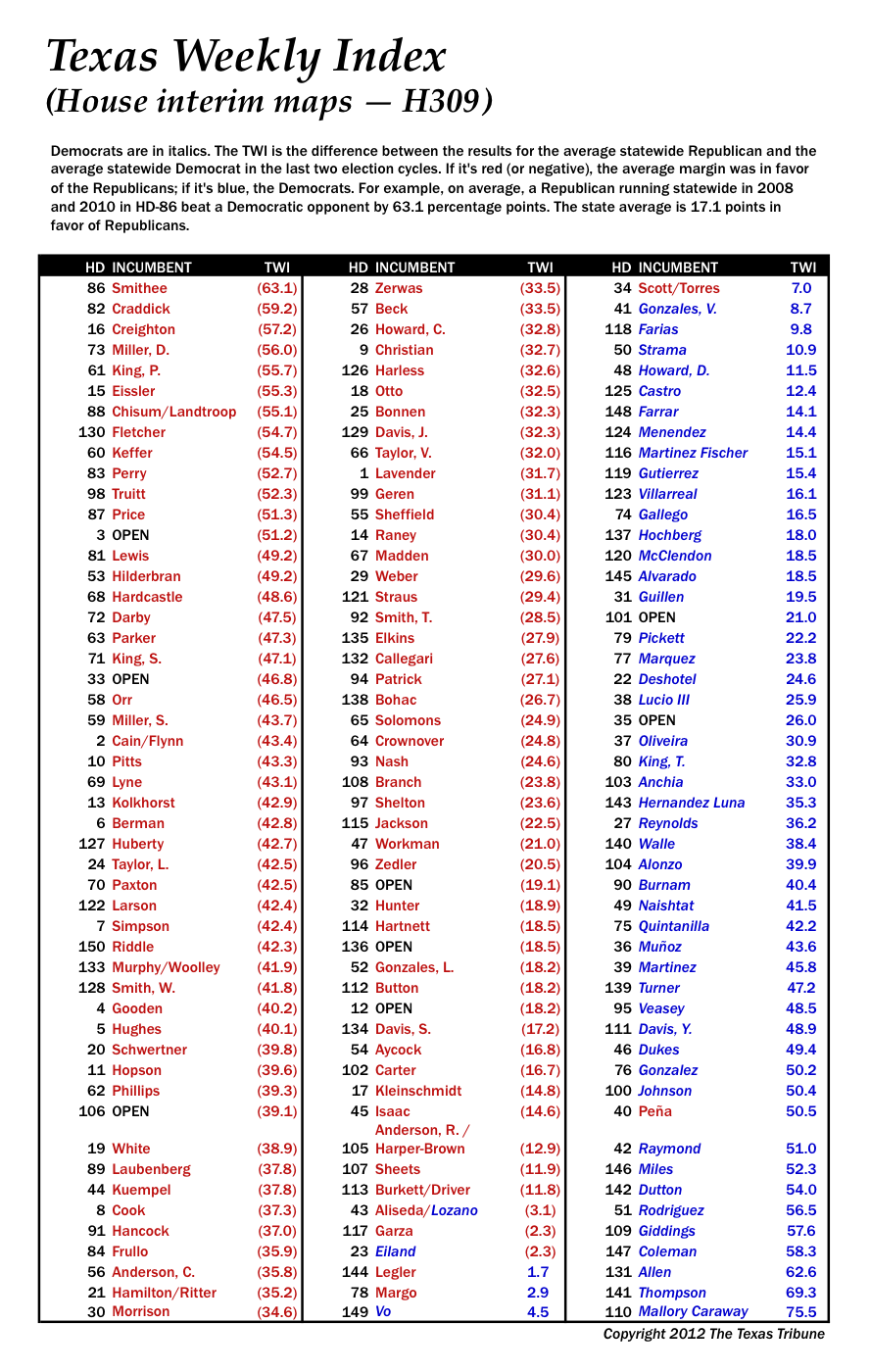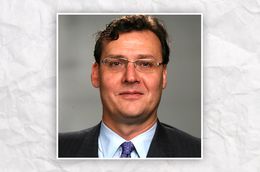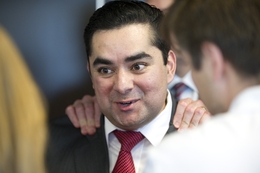
With the pixels still warm from news that Rep. J.M. Lozano of Kingsville is switching to the Republican Party, former Rep. Yvonne Gonzalez Toureilles, D-Alice, announced she will be in the HD-43 race. That's a swing district that voted, on average, for Democrats in 2008 and for Republicans in 2010. Lozano is a freshman recruited by Democrats in 2010 to knock off one of their own — Tara Rios Ybarra of South Padre Island — in the primary. Now the people who recruited him will be attacking him and the people he opposed will be backing him. Toureilles fell to Rep. Jose Aliseda, R-Beeville, in the 2010 general election; he's giving up his seat to run for local office, and would otherwise have been paired with Lozano. In an earlier map drawn by the courts and opposed by the Republicans, Lozano was running as an unopposed Democrat.
• Candidates have until April 9 to start sleeping in the districts they want to represent and at least two — there will be more — have announced plans to pack up and go. Roger Williams will move from his home in Parker County to Travis County, where he says he and his wife are now looking at houses. He's running for an open congressional seat. And former Rep. Joe Moody and his wife will be moving a relatively short distance into El Paso's HD-78, where the Democrat is challenging Republican incumbent Dee Margo. Moody has to move to be eligible. Williams doesn't, as a legal matter, but apparently feels the political need.
• Rep. Ken Legler, R-Pasadena, won't seek another term. Legler complained more or less openly that the judges didn't draw him a safe district, leaving him instead in a seat where he would have to compete every two years. "That is a political distraction from legislative responsibilities that I choose not to accept," he said. He added that Pasadena was cut up in the maps, with pieces going to four different districts.
• What was only an "if" last week is now a candidacy: Former state Rep. Domingo Garcia will run in CD-33, the district drawn with help by the Texas Latino Redistricting Task Force in which he took part. He'll face state Rep. Marc Veasey, D-Fort Worth, who started off with a slew of endorsements from current former officeholders and community leaders. Garcia says Veasey and Fort Worth City Council member Kathleen Hicks will be his toughest opponents. That's a swat at Dallas City Councilman Steve Salazar, who once lost an election to Garcia's wife, Elba Garcia, who is now a county commissioner. Another layer of drama: State Rep. Roberto Alonzo, D-Dallas, a former Garcia pal who later beat him in a House race, has endorsed Salazar.
• Former Texas Secretary of State Roger Williams will join the CD-25 race, having bailed on the race for U.S Senate and then filing for Congress only to watch that district get drawn out from under him. Former Texas Railroad Commissioner Michael Williams has been elected statewide, so he starts as the name in the race. He went the same route, getting out of the U.S. Senate race, and filing in a congressional district that got erased in court. Former Halliburton exec Dave Garrison is in with significant money of his own, as is Wes Riddle, a retired Army officer, who has been working the Tea Party activists in the district. Chad Wilbanks used to be executive director of the Republican Party of Texas, and Justin Hewlett was mayor of Cleburne. The biggest population centers are in Travis and Johnson counties; that's Austin and Cleburne.
• Former state Rep. Solomon Ortiz Jr., D-Corpus Christi, won't run this time after all. Instead, he's endorsing former Rep. Abel Herrero, D-Robstown, in the HD-33 race. On the Republican side, two Corpus incumbents — Raul Torres and Connie Scott — are paired. It's a swing district that leaned to the Democrats in recent elections. Torres won't stay in that one, instead opting to run for the Texas Senate against incumbent Democrat Juan "Chuy" Hinojosa, D-McAllen.
• That SD-9 race in Tarrant County will be a three-way Republican primary, with Rep. Todd Smith, R-Euless, saying he'll get into it. Reps. Kelly Hancock, R-North Richland Hills, and Rodney Anderson, R-Grand Prairie, were already in. Smith comes in with endorsements from Victor Vandergriff, who looked at the race but will serve as Smith's treasurer, and from a number of elected officials that includes Tarrant County Judge Glen Whitley and the mayors of Arlington, Grand Prairie, Grapevine, Euless, Hurst, North Richland Hills, Watauga, Richland Hills, Keller, Colleyville, Trophy Club and Westlake. Former state Rep. Toby Goodman, who also looked at the race, is endorsing Smith, too.
• With Smith out of the House race, Bedford City Council member Roger Fisher will get in, with the outgoing incumbent's blessing. He'll face Jon Stickland, who was challenging Smith. Both men are Republicans.
• Former Rep. Chris Turner, D-Grand Prairie, is in HD-101 in the interim House maps instead of a district of another number, but he'll still have to run against former Rep. Paula Hightower in the primary. [Editor's note: We had her in another race in an earlier version, now corrected. Sorry, sorry, sorry...]
• State Rep. Pete Gallego, who is hoping to stay out of a primary with former colleague Ciro Rodriguez, is pulling together lists of San Antonio bigwigs who support him. Gallego has filed to run in CD-23, where San Antonio Republican Francisco "Quico" Canseco, is the incumbent. Rodriguez hasn't filed. Gallego's latest list includes almost two dozen activists; an earlier list had several state House members and other luminaries among 123 endorsers from around the district. Rodriguez was in the Texas House, then served in Congress, most recently losing his seat in 2010 to Canseco.
• Miriam Martinez, D-Edinburg, is moving her candidacy to HD-41 from HD-40 — the sort of move you'll see all over the state as candidates adjust to the new political maps issued by the federal courts. Both are Democratic districts, but HD-41 is closer to being a swing district than the other.
• After the maps came out, this announcement came in: Michael Pruneda of Pharr won't run for the Texas House after all, but isn't ruling out a future run.
• Bastrop County Judge (and former A&M yell leader) Ronnie McDonald stepped down this week, saying he's deciding whether to challenge U.S. Rep. Blake Farenthold, R-Corpus Christi, or state Rep. Tim Kleinschmidt, R-Lexington. McDonald, a Democrat, has been county judge for 14 years. Both of those are, on paper, Republican roosts. The Farenthold seat has a Texas Weekly Index of 19.8, meaning the average Republican beat the average Democrat in statewide races by that amount in the last two cycles. HD-17 has a Republican TWI of 14.8.
• Democrat Dan Grant decided not to challenge U.S. Rep. Michael McCaul in CD-10, saying the lines that came out of the federal court in San Antonio "solidly protect" the incumbent.
• Texas Railroad Commissioner Barry Smitherman, defending the seat he won by gubernatorial appointment, started a round of radio ads to introduce himself to Texas voters. He'll face Comal County Commissioner Gregory Parker in the primary. Smitherman, by the way, picked up an endorsement from the Texas Association of Realtors.
• Sen. Brian Birdwell, R-Granbury, got a reelection endorsement from the NRA and the Texas State Rifle Association.
• Rep. Larry Taylor, R-Friendswood, who's chasing a Senate seat, picked up an endorsement from the Texas Alliance for Life. He's running for the SD-11 seat currently held by Mike Jackson, R-La Porte, who is in turn running for Congress. Taylor got an endorsement from the Texas Academy of Family Physicians PAC, too.
• The Texas Right to Life PAC endorsed Susan Narvaiz, a San Marcos Republican running in the new CD-25 that starts in San Antonio and ends in Austin.
• Eye-PAC, the political arm of the Texas Ophthalmological Association, endorsed Bennett Ratliff in the crowded Republican race for an open House seat in HD-115 in northwest Dallas County. So did TEXPAC, affiliated with the Texas Medical Association.
• The PAC of the Texas and Southwestern Cattle Raisers Association endorsed Cecil Bell Jr. in HD-3. Bell is a member of that group.
• Former Dallas Cowboy Daryl Johnston dropped his endorsement of Tom Leppert in the U.S. Senate race and says he'll vote for Craig James in the GOP primary instead.


